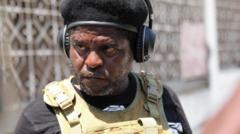Amid a backdrop of U.S.-El Salvador relations, President Bukele decided not to facilitate the return of Kilmar Ábrego García, a Salvadoran national mistakenly deported from Maryland to El Salvador, igniting political discourse surrounding immigration and criminal justice.
**El Salvador Refuses to Repatriate Wrongly Deported Man from the U.S.**

**El Salvador Refuses to Repatriate Wrongly Deported Man from the U.S.**
President Nayib Bukele of El Salvador dismisses the return of Kilmar Ábrego García, who was mistakenly deported from the U.S. and is currently held in a controversial prison.
In a recent meeting at the White House with former President Donald Trump, Bukele asserted that El Salvador would not cooperate in repatriating Kilmar Ábrego García, who was erroneously deported and is now confined in a notorious prison. The U.S. Supreme Court recently mandated that the Trump administration should facilitate his return; however, the response from the White House was a claim that the decision rests with El Salvador. Bukele’s firm stance reflects broader implications of the partnership between the two nations, particularly concerning the deportation policies targeting alleged gang members.
While the Trump administration suggests Garcia has MS-13 affiliations—a claim his legal representatives dispute—his case exemplifies the complexities of U.S. immigration law and the tensions involved. The administration has executed a series of deportations to El Salvador under the guise of a partnership addressing crime, with over 200 individuals reportedly sent to the Center for the Confinement of Terrorism (Cecot). Critics have raised concerns about human rights violations in such prisons, but Trump has largely downplayed these allegations.
Ahead of Bukele’s visit, Trump showered him with praise for his stern approach to crime and gang violence, claiming that Bukele is effectively addressing threats that have permeated U.S. borders. The recent developments underscore a reciprocal diplomatic relationship that intertwines legal, political, and humanitarian dimensions amid rising tensions over immigration practices and accusations of systemic injustices against deportees.
As El Salvador navigates its internal policies while cultivating international ties, the fate of Kilmar Ábrego García sheds light on the urgent need for dialogue surrounding accountability in deportation and criminal justice systems.
While the Trump administration suggests Garcia has MS-13 affiliations—a claim his legal representatives dispute—his case exemplifies the complexities of U.S. immigration law and the tensions involved. The administration has executed a series of deportations to El Salvador under the guise of a partnership addressing crime, with over 200 individuals reportedly sent to the Center for the Confinement of Terrorism (Cecot). Critics have raised concerns about human rights violations in such prisons, but Trump has largely downplayed these allegations.
Ahead of Bukele’s visit, Trump showered him with praise for his stern approach to crime and gang violence, claiming that Bukele is effectively addressing threats that have permeated U.S. borders. The recent developments underscore a reciprocal diplomatic relationship that intertwines legal, political, and humanitarian dimensions amid rising tensions over immigration practices and accusations of systemic injustices against deportees.
As El Salvador navigates its internal policies while cultivating international ties, the fate of Kilmar Ábrego García sheds light on the urgent need for dialogue surrounding accountability in deportation and criminal justice systems.



















